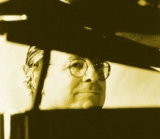 The pianist Fritz Pauer is a man of quiet words. The fact that he is one of the few Austrian musicians of immense international recognition is not something he would blare out to the general public. Nor the fact that he has already played together with great legends of the jazz scene like Fatty George, Friedrich Gulda, Art Farmer, Johnny Griffin, Carmell Jones, Pony Poindexter, Don Byas, Booker Ervin, Dexter Gordon, Lee Konitz and Don Menza. Even the honor of the American pianist Horace Parlan calling Fritz Pauer one of the “three most impressive European pianists” is only pointed out by people who write about him. He solely lets his music speak for him, his playful virtuosity, his profound understanding of music, which have made him one of the most popular musicians of the scene. One of the reasons for the appreciation of his music is how Fritz Pauer brilliantly uses the variety of stylistic contexts between tradition and modernity.
The pianist Fritz Pauer is a man of quiet words. The fact that he is one of the few Austrian musicians of immense international recognition is not something he would blare out to the general public. Nor the fact that he has already played together with great legends of the jazz scene like Fatty George, Friedrich Gulda, Art Farmer, Johnny Griffin, Carmell Jones, Pony Poindexter, Don Byas, Booker Ervin, Dexter Gordon, Lee Konitz and Don Menza. Even the honor of the American pianist Horace Parlan calling Fritz Pauer one of the “three most impressive European pianists” is only pointed out by people who write about him. He solely lets his music speak for him, his playful virtuosity, his profound understanding of music, which have made him one of the most popular musicians of the scene. One of the reasons for the appreciation of his music is how Fritz Pauer brilliantly uses the variety of stylistic contexts between tradition and modernity.
Born in 1943 in Vienna, Fritz Pauer started playing the piano at the tender age of five years. “Mainly to compete with my sister,” he says. At first she was the one who got piano lessons, while he had to be satisfied with watching. Driven by this experience of such a glaring injustice, the Viennese began to deal more intensively with the instrument. In his teen years, he instantly fell in love with jazz music and boogie-woogie, which was presented to him by his brother-in-law and his cousin. Above all, it was the pieces of a Thelonious Monk or Red Garland, which enthused Fritz Pauer from the very first moment.
The decision to pursue a musical career came at a time when Fritz Pauer realized that he could earn good money playing music. Thus, the Viennese received quite well-paid monthly engagements for concerts in various bars and restaurants in the city. Through Fatty George, who frequently performed in the Marietta-Bar, the young pianist soon became acquainted with big names of the local jazz scene, such as Friedrich Gulda and Hans Koller. Acquaintances, which virtually paved the way for a successful career. The first concert tours followed, including Switzerland, where Fritz Pauer worked the black and white keys in Oskar Klein’s band. The pianist can be heard for the first time on one of Oskar Klein’s albums. Memorable is also the album “Multiple Koller”, which was recorded together with Hans Koller in the course of the “Rhein und Ruhr” Festival.
In 1964, the Viennese moved for four years to Berlin, where he performed with various formations in legendary jazz clubs like the Jazzgalerie, Doug’s Night Club and the Eden Saloon. He soon got to know the vibraphone player Dave Pike, who thereafter accompanied Pauer on his musical path for many years. In general, Pauer’s stay in Berlin was very successful. From an artistic point of view, including the financial aspect, he found a spot in various big bands of broadcasting stations, for which he also began to write first arrangements. This of course also meant that the Viennese met internationally renowned jazz greats such as Dexter Gordon, Johnny Griffin and Duke Ellington. Fritz Pauer took his chances and seized every available opportunity to make a name for himself within the scene.

No less varied, exciting and valuable were the following years of the exceptional pianist. As a pianist, composer, arranger and conductor in the ORF Big Band, he had an important and prominent role, which turned him into one of the leading personalities of the local jazz scene. Moreover, his trio named after himself (Fritz Pauer Trio) gained international fame. He continued his work as a piano teacher at the jazz department of the Conservatory of Vienna and taught today’s well established and prestigious musicians such as Matthias Rüegg, Agnes Heginger and Simone Kopmajer.
It is easy to explain why Fritz Pauer, who was awarded in 2003 with the Golden Decoration of Merit of the Republic of Austria, is still one of the most influential personalities in the local jazz scene. Like few others, the piano virtuoso, who is currently working at the University of Music and Dramatic Arts Graz, understands how to build a bridge from the tradition to the modern and reconcile, at first glance, opposite forms of playing with each other.
Alongside legends such as Friedrich Gulda and Joe Zawinul, Fritz Pauer definitely belongs to one of the greats of the local jazz scene, which is reflected by the “Recognition Award for Music 2008” and the title “Professor”.
